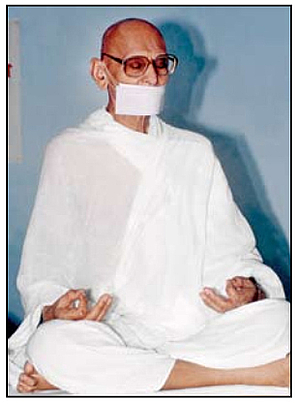
Centre of Jaina Studies Newsletter: SOAS - University of London
At the time of his sudden death in the small Rajasthani town Sardārśahar, Ācārya Mahāprajña was arguably the most prominent contemporary Jain monk, well known and respected throughout the world, not least because of his frequent appearances on Indian Television, reflecting his modernist outlook. I first met him in 1981, when I visited the 125th Maryādā Mahotsava in Ladnun to get in touch with the leaders of the Śvetāmbara Terāpanth order. At the time, Yuvācārya Mahāprajña (initiation name: Muni Nathmal) was suffering from an infection and had to take rest. To my surprise, he nevertheless got up immediately to talk to me, a young foreign student of Jainism. Amongst other things, I asked him about the types of medicines he took. He answered that he used no medication at all. To fight his infection he applied a new technique of relaxation and meditation, prekṣā dhyāna, which he had developed himelf. He lived for ninety years, having spent the best part of his time on earth working to promote global awareness of Jain principles, and to further education.
It is entirely due to the foresight and initiative of Ācārya Tulsī and Yuvācārya Mahāprajña both child initiands from rural Rajasthan without formal education who worked closely together for almost their entire lives that the Terāpanth order reformed itself and adopted an interest not only in world renunciation but also in world transformation, that is, in the improvement of the conditions of existence, on a regional, national and global scale. An important element of their outward looking, modernist orientation was their keen interest in the interaction between Jainism and modern science, especially biology, medicine and neuroscience, and also the fields of comparative philology, philosophy, ethics, psychology, social work and health. In the Jain world, Ācārya Tulsī and Yuvācārya Mahāprajña are renowned for their support of social reform, and in India generally for the promotion of universal social morality, through the nonsectarian so-called aṇuvrata, or small vow, movement, and the jīvana vijñāna, or science of living, initiative.
Ācārya Mahāprajña´s last grand project, the Ahiṃsā Yātrā, or Pilgrimage of Non-Violence, is well known. Less well publicized, but equally significant are his contributions to Prakrit philology and comparative philosophy, for which he is renowned in Indological circles. The Ladnun 'critical edition' of the thirty-two Terāpanth Āgamas (1974-1985) and related Dictionaries and Encyclopedias, and other important Jain scriptures published under Yuvācārya Mahāprajña's guidance, inspired by Ācārya Tulsī, are monumental achievements which will stand the test of time. The first 'Jain University', the Jain Vishva Bharati Institute, at Ladnun, the birth place of Ācārya Tulsī, where much of the editorial work continues to be done by many learned Terāpanth sādhus, sādhvīs and samaṇīs, has developed into a global centre for the study of Jainism.

The academic work at Jain Vishva Bharati has made a global and perpetually increasing impact through the educational mission of the new Samaṇ Order, a category of novice nuns and monks whose rules and regulations permit the use of vehicles and travel abroad. Countless academics, students, ministers of religion, politicians and business people throughout the world have benefitted from the contact with the samaṇīs of the Terāpanth, many of whom have university degrees and communicate with ease in English as well as in many Indic languages. Modern university education for Jain mendicants and academic research are new developments within Jain culture, strongly supported by Ācārya Mahāprajña. Its fruits are manifest in the articles published in research journals such as Tulsī Prajñā by Jain nuns, educated at the Jain Vishva Bharati Institute, who nowadays write PhDs on topics, such as Jainism and Existentialism, which were previously only touched by western style academics.[1]
The impressive list of the achievements of Ācārya Tulsī and Ācārya Mahāprajña could be easily extended and would fill many pages. On a personal note, what I found most inspiring in both of these great Rajasthani saints and scholars was their spirit of openness and universalism combined with the strict observance of the ancient Jain codes of conduct oriented toward the minimization of violence.
I shall remember Ācārya Mahāprajña, a veritable Jain polymath, as one of the great Indian philosophers of our times, who practiced what he preached.
 Dr. Peter Flügel
Dr. Peter Flügel